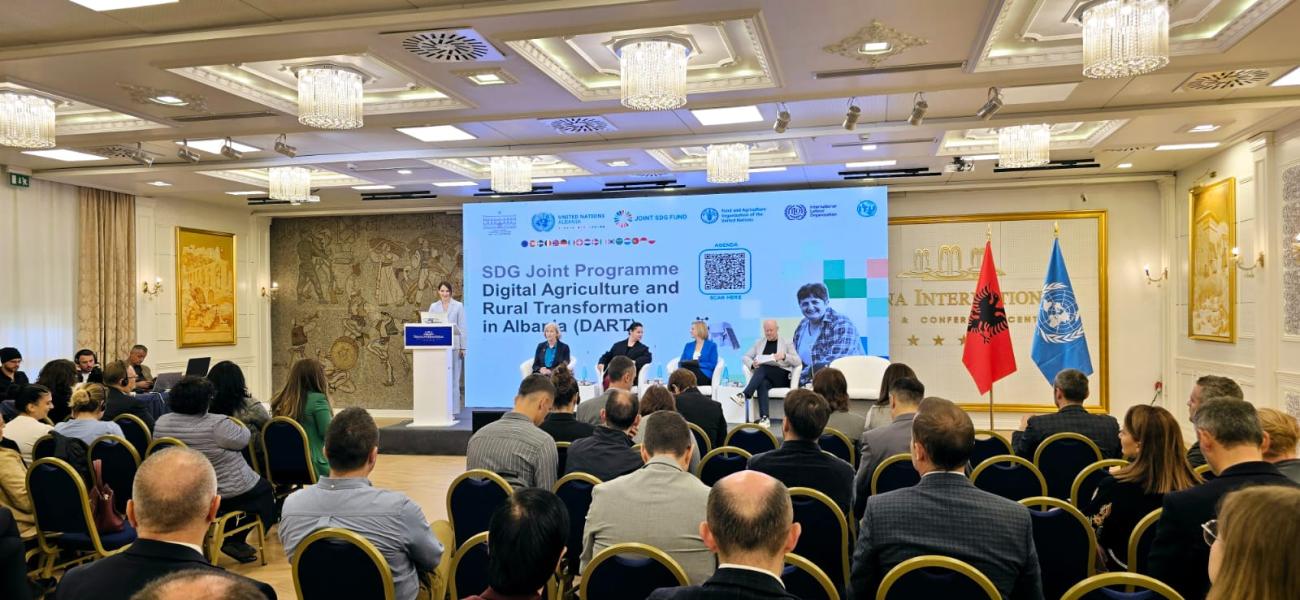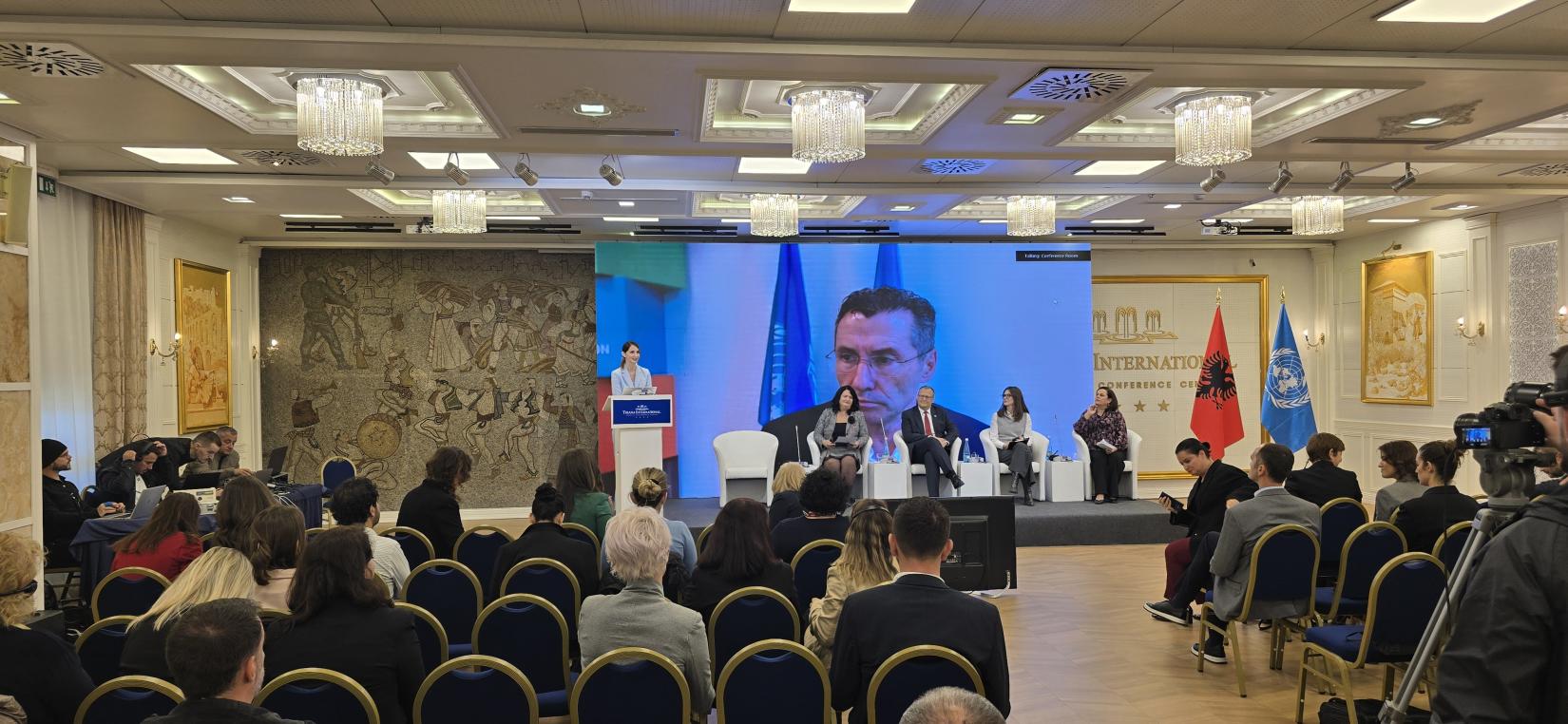United Nations launches ambitious programme for sustainable digital transformation of Albania’s agriculture

Programme kick-off event organized in Tirana
Albania, with United Nations partners, has launched a groundbreaking joint programme leveraging digitalization to advance sustainability goals with systemic interventions particularly targeted at smallholder farmers.
The “Digital Agriculture and Rural Transformation" (DART), is a three-year (2024—2027) programme financed by the Digital Transformation Window call of the Joint SDG Fund with a total budget of USD 3.3 million. The initiative aims to achieve its objectives by developing a national digital agriculture strategy and action plan aligned with the European Union’s (EU) legal framework, by improving the delivery of digital public services through the Albanian Farmers’ Portal, and by developing digital capacities among small-scale farmers, students, technical vocational and educational training schools and centres, and public sector employees.
The Food and Agriculture Organization of the United Nations (FAO) is leading the implementation of the initiative with its partners, the International Labour Organization (ILO), and the International Telecommunication Union (ITU), as well as the Ministry of Agriculture and Rural Development, and the Ministry of Finance and Economy of Albania.
Minister of Agriculture and Rural Development of Republic of Albania, Anila Denaj stressed that DART will play a critical role in supporting Albania’s EU accession process by improving compliance with EU standards and regulations, particularly in agriculture and rural development. She highlighted that DART is fully aligned with Albania’s broader national strategies, such as the National Strategy on Agriculture, Rural Development, and Fisheries 2021-2027, the Digital Agenda 2022-2026, and the National Strategy for Gender Equality. Minister Denaj noted that digitalization in agriculture is not just about technology; it’s about systemic change.
“Through DART, we aim to use digital tools as catalysts to enhance transparency, improve production efficiency, support regulatory compliance, and save costs across the agricultural sector” – she said.
Fiona McCluney, UN Resident Coordinator in Albania highlighted that the initiative carries immense significance for Albania's agricultural future and the broader ambitions of the United Nations.
“This collaboration is exactly the forward-thinking action intended when Member States adopted the Pact for the Future in September this year. By encouraging innovation and leveraging technology, DART programme will demonstrate how joint efforts can deliver results on the ground to vulnerable people.”
McCluney praised the constructive collaboration between UN entities in Albania with of Albania’s Ministry of Agriculture and Rural Development, the EU, Sweden, and Spain as contributors to the Joint SDG Fund.
Hubert Perr, Head of Cooperation at the EU Delegation to Albania, said that the EU is happy to support this project which perfectly aligns the objectives of the UN sustainable development goals with the EU accession process of Albania in the agriculture sector.
“The EU long ago recognised the importance of digitalisation, acknowledging that research, innovation and technologies can assist agriculture in addressing key challenges such as providing sufficient food while ensuring production sustainability. Digitalisation also enables the administration to provide fast and efficient support to the agricultural sector. New technologies of farming practices enhance productivity and competitiveness on the world markets, and enable producers to become more resilient in times of climate change. Digitalisation is an essential tool to save scarce labour resources and reduce the ecological footprint, in alignment with EU’s Green Agenda for the Western Balkan.”
Raimund Jehle, FAO Representative in Albania highlighted the role of FAO, together with ILO and ITU, in this initiative by stating that DART is part of a longer transformation journey.
“In our role of leading partner, we have a commitment to deliver the ambitious objectives of the programme without forgetting the context of Albanian agriculture, which is so rich with small-scale farmers, high quality produce, but also has many vulnerabilities from climate change to generational renewal,” stressed Jehle.

“Skills are an important catalyst for socio-economic development and are needed by farmers and agricultural professionals to benefit from the digital transformation of the agricultural sector and, in particular, to ensure inclusion of smallholders and disadvantaged groups in the transformation,” says Alessandra Molz, Senior Skills and Employability Specialist of the ILO Office for Central and Eastern Europe.
"Robust ICT infrastructure is essential to drive progress across all economic sectors, including agriculture. Through this project, we aim to provide the expertise and resources needed to enhance rural connectivity and support rollout of a 'building blocks' approach to develop and deliver public services more effectively," said Dr Cosmas Luckyson Zavazava, Director of the ITU Telecommunication Development Bureau.
The joint programme has been co-designed by Albania’s Ministry of Agriculture and Rural Development and the UN Resident Coordinator’s office in Albania.
Background
In Albania, approximately 41 percent of the population lives in rural areas, the majority of whom are involved in agricultural activities. Agriculture remains a cornerstone of the Albanian economy, contributing 19 percent to the gross domestic product and 36 percent to total employment in 2020. Nearly half of the jobs in the economy are directly or indirectly reliant on the broader agricultural and food system— encompassing services, processing, and manufacturing.
Many factors influence the long-term sustainability of agriculture and rural areas, including climate change, access to land, governance, gender quality, public infrastructure, markets, knowledge and technologies and other factors.
Albania is on the path to enter the European Union while pre-accession negotiations are unfolding in numerous areas, including food, agriculture and rural development. This process will entail the establishment of electronic information systems that are aligned to those required by the EU as the cornerstones of modernized agrifood systems and policies, as well as the mobilization of resources to support farmers’ skills development and uptake of digital technologies.
Expected impacts
By 2027, the Digital Agriculture and Rural Transformation programme will increase agricultural productivity and competitiveness in food systems, advance socioeconomic growth, gender equality and human rights, and enhance rural livelihoods through comprehensive farmer-centric policy development in Albania.
Vulnerable populations are directly addressed by the programme. There are 7 500 women who will be beneficiaries of digital services and 290 others who will receive skills development. To reverse the out-migration of younger generations from rural areas, where access to quality education and employment is limited, training will be provided to over 180 students and 120 young farmers.
The joint programme further advances the achievement of several SDGs, including SDG 1 (No Poverty), SDG 2 (Zero Hunger), SDG 4 (Quality Education), SDG 5 (Gender Equality), SDG 8 (Decent Work and Economic Growth), SDG 9 (Industry, Innovation, and Infrastructure), and SDG 10 (Reduced Inequalities). DART will implement actions under the priority areas of the UN Forum on Sustainability Standards and UN Secretary General’s Call to Actions by investing in innovation and technology, deepening participatory design and implementation inclusive of women and young people, and by incorporating food systems strategies into national policies. It bridges the gap between vision and impact, propelling Albania's agricultural sector into a digitally-driven sustainable future while contributing to global SDGs.
***
All joint programmes of the Joint SDG fund are led by UN Resident Coordinators and implemented by the agencies, funds and programmes of the United Nations Development System (UNSDG). With appreciation for the contributions from the European Union and the governments of Belgium, Denmark, Germany, Ireland, Italy, Luxembourg, Monaco, the Kingdom of the Netherlands, Norway, Poland, Portugal, Republic of Korea, Saudi Arabia, Spain, Sweden, and Switzerland to a transformative movement for achieving the SDGs by 2030.









